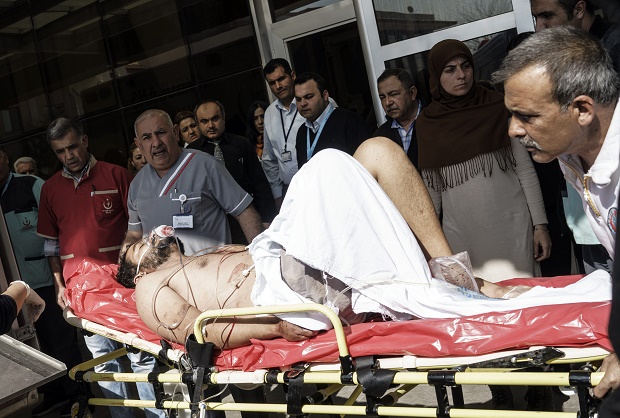
Turkish medics carry a wounded Syrian to a hospital in Kilis, Turkey, Monday, Feb. 15, 2016. An airstrike destroyed a makeshift clinic supported by an international aid group in Azaz in northern Syria on Monday, killing and wounding several people, activists and aid group said. Doctors Without Borders, also known by its French acronym MSF, said in a statement that the hospital was hit with four times in two series of at least two attacks. It said the attacks were minutes apart adding that at least eight members of staff are currently missing. AP Photo
KILIS, Turkey—After a harrowing 15-hour journey by minibus, dodging gunfire and explosions, a group of Syrian refugees reached a village near Turkey, desperate to cross the recently shut border into safety.
“The people smugglers are there and they’re shouting ‘Turkey! Who wants to go to Turkey?'” Fatima al-Ahmed recalled, after reaching the town of Kilis on the Turkish side of the frontier.
“They are mean, violent, and only think about money. They push us like beasts, hitting the women who don’t walk fast enough, even when they are carrying babies.
“It’s terrible, it’s the law of the jungle.”
The 27-year-old woman told AFP about her clandestine escape from Aleppo to Kilis in southern Turkey a week ago—a journey that in peacetime would have taken little more than 90 minutes.
Turkey’s decision to close its border with Syria has become a boon for smugglers who are charging refugees to secretly cross over.
Like the traffickers who make thousands of dollars off each boat-load of migrants crossing the Mediterranean to Italy or the Aegean to Greece, smugglers at the Turkish border take advantage of Syrians who refuse to wait in overcrowded tent camps for Ankara to possibly open up the crossing.
READ: Up to 20,000 stranded at Syria border with Turkey—UN
Fatima, sitting at a table outside a cafe in Kilis, said she crossed the border with her two-year-old son in her arms through an opening cut in the barbed wire fence.
She had decided to flee her home in the rebel-held neighborhood of Sakhur in eastern Aleppo, when her husband was killed a month ago in the bombing while he was out looking for food.
‘Too many people’
The smugglers organised them “in groups of eight, with our neighbors,” she said, speaking in a soft voice.
“They helped me pay, I didn’t have enough money. Before, everything was organised in Aleppo, we used smugglers we trusted.
“But now since the Russian bombing, there are too many people,” she said referring to the Russian aerial bombing campaign launched in September last year in support of Syrian President Bashar al-Assad’s regime.
READ: Russia fails in UN bid to rein in Turkey over Syria
Like others in Kilis, Fatima told how the Syrian smugglers were in constant contact, by cellphone and walkie-talkie, with the Turkish smugglers who would take charge of the refugees once they were over the border.
“They made us wait, sitting on the ground under some trees, until it was time—the time when the Turkish soldiers who they paid are on guard and look away while we pass,” she said of the clandestine journey that cost around 300 euros ($330).
That sum was too high for the family of Ahmad, a scrawny 14-year-old, who looks even younger than his age.
He was among the last to survive in the ruins of Marjeh, his battered Aleppo neighborhood. When a barrel bomb dropped from a helicopter killed two of his brothers and wounded their father, the family piled into a truck and took off for the border.
‘We were lucky’
“We couldn’t pay the smugglers, so we hid. We crawled up to the barbed wire fence and slipped underneath it,” said the teenager with a mischievous look, who has never been to school.
“We were lucky, the Turkish police found us but since we were with a lot of children, they didn’t send us back. They even called for a bus.”
At Kilis, the flow of refugees has begun to slow down, a sign that the closing orders given to the Turkish guards are being adhered to more.
The price of the secret passage has risen to as high as $1,000.
And no matter the price, a planned escape sometimes just doesn’t work.
Yazan Ahmad, 35, has been waiting for his parents who fled the Syrian town of Tal Rifaat, which was seized last week by Kurdish militia.
“They are in a camp just on the other side,” he said. “Last night, my brother paid some smugglers to try to get them out… But they failed. The Turks fired over their heads.”
Meanwhile those who are stuck in Aleppo live as prisoners of Syria’s five-year civil war.
“My neighbor in Aleppo, she’s alone with five children, and she’s desperate,” Fatima said. “I spoke to her yesterday. She was crying. She doesn’t know what will happen next.”